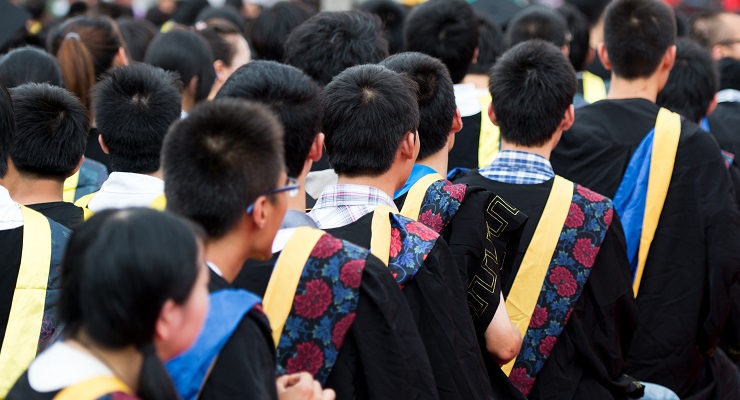
Midway through her journalism degree at an Australian university Chloe, an international student from China, was confronted by a Chinese classmate who accused her of taking an anti-Beijing line in a story she wrote.
Threatened with being reported to the Chinese Communist Party but wanting to continue to develop her skills and profile as a journalist, Chloe concluded that her only safe options were to avoid reporting on matters sensitive in Beijing, or to use a pseudonym (as she is in this article).
“I felt worried that I was just an international student and I would have no protection from the Australian government were I to get in trouble, so I started to think about ways that I can protect myself,” she said.
Chloe’s experience highlights problems facing journalism schools in Australia and other Western nations around potential risks confronting Chinese students enrolled in subjects teaching democratic media theory and practice.
With Chinese students navigating tightening media constraints from their government and many zooming into lectures from inside China due to COVID-19 travel restrictions, the pressure on educators to recognise potential risks has intensified.
A report released yesterday by Human Rights Watch indicates that although some lecturers scramble to understand and respond to concerns, university administrators are turning a “blind eye”, leaving educators and students to figure it out for themselves.
“Australian university administrators are failing in their duty of care to uphold the rights of students from China,” said the report’s author, Sophie McNeill, Australia researcher at Human Rights Watch and a former ABC foreign correspondent.
“Australian universities rely on the fees international students bring while turning a blind eye to concerns about harassment and surveillance by the Chinese government and its proxies. The universities should speak out and take concrete action to support the academic freedom of these students and staff.”
After she was harassed, Chloe reported the incident to “several university programs” tasked with student safety, but felt they weren’t equipped to help. “I ended up going to the teaching staff who were much more helpful than the university programs, but really it should be the university programs which are tasked with student safety and support with this type of thing,” she said.
The report found that harassment, surveillance and intimidation of pro-democracy students from China has increased over the past decade. Yet universities had failed to develop policies and systems that adequately discourage and respond to this behaviour.
Li Wei, a student whose experience is cited in the report, said his parents had been visited by Chinese police due to pro-democracy messages he had posted on Twitter, and he has decided he cannot return home. Another student reported that he had been pressured by government officials to spy on Uygher diaspora in Australia. He ended up moving to a new city where there was not a large local Uyghur community.
“The majority of students who experienced harassment didn’t report it to their university,” McNeill said. “They believe their universities care more about maintaining relationships with the Chinese government and not alienating students supportive of China’s Communist Party.”
Their lecturers are also feeling on unsafe ground. The report found university staff were not getting appropriate guidance and support. One unnamed academic is quoted saying: “The [university administrators] make it very clear you have to look after yourself.”
Universities Australia chief executive Catriona Jackson says universities have long-established and robust policies to deal with coercion and intimidation on campuses, and urged students to report incidents of concern.
Although the report does not home in on experiences in a particular degree, McNeill says the study of journalism looms as a particular risk for Chinese students.
In April her colleague Sophie Richardson, China director at Human Rights Watch, shared a tweet: “How to deter young people in China from taking up journalism — threaten it can be conflated with national security crimes.”
It was in reference to an article released by Chinese news publication Xinhua about three students studying in Hong Kong who had allegedly committed espionage. Two of the students mentioned were media or journalism students, one having worked for a Western media organisation in China and abroad and had “spread anti-China material”, the article said.
This is symptomatic of increasing crackdowns on media in the face of China’s sweeping national security laws for Hong Kong, including the arrest of a 22-year-old Chinese citizen for allegedly “subverting state power” after he worked as an intern for a foreign media outlet, the trial currently under way for Australian journalist Yang Hengjun, and the recent arrest of a senior journalist working for the now-closed Apple Daily newspaper.
One potential solution at Australian universities, at least in the short term, could be to steer students enrolling from China to reporting on non-controversial issues when required to produce stories for applied subjects. But for many Chinese students seeking opportunities inside Australian media, their knowledge and engagement with newsworthy and controversial issues and their language skills were their greatest strengths.
“The fact that we’re in Australia, and China is a really big topic in the political discussion, means there’s not really a way that you can really stay away from reporting controversial issues,” said one Chinese-born former journalism student, now an Australian citizen.
The article also appears in Citizen, a publication of the Centre for Advancing Journalism at the University of Melbourne. Jordyn Beazley is a journalist at the Citizen.








My impression is that the CCP has been intimidating Chinese tertiary students for some years, pre-Covid. Sure, the administrators love the dollars and won’t ask awkward questions, but universities are big places with lots of different groups. Where are the student unions on this? Where are the faculty heads? The lecturers? The clubs and societies? For centers of intellect and ethics, the universities are showing little of either.
I lectured at a university couple of years ago, after general orientation meeting before semester start, did not have any face to face interaction with any administrative or academic personnel. Students themselves were fine but questioned the value of the high fees they paid….
You may find that a large number of the, small number, of Chinese students (50 IIRC hardly a huge number) who complain are from either HK or Taiwan.
I’d rather know the number of Chinese students from the PRC who are
frightened to speak out. I know that in their shoes I wouldn’t.
Yes no doubt what happened to Chelsea manning, Julian Assange & Edward Snowdon frightened a lot of whistleblowers also. Oops -they’re all Westeners suffering US justice applauded by all 5 eyes.
Could be mistaken but last I heard Chelsea Manning was doing well on the US talk circuit an Ed Snowden was living the high life in Russia with his wife and new born child. Not much to be frightened about. On the other hand haven’t heard much lately about the Nobel peace prize winner, Liu Xiaobo. Anyone heard how he’s going?
Jules Assange has had a rough time but at the same time he has committed a couple of Cosby type offences. But heck if Bill can get away with it why shouldn’t Jules. Why don’t some of you guys chip in and hire Bill’s lawyer to spring Jules?
That was low of you to equate Assange with Cosby.
Not on any planet in the unknown multiverse is there the slightest similarity.
Meanwhile the South China Morning Post reports that increased coal exports from the United States are filling the gap left by China’s ban on coal from Australia imposed because of our toadying to the United States. Just sayin’. It’s good to know who your loyal friends are, isn’t it?
Cutting off their nose to spite their face – US coal is more expensive.
Not the point. It achieves two outcomes – reducing reliance on our Coal until other permanent sources are online and increases their obligations to the BSA under their Trade agreement.
Surely not another Beasley – hopefully not related to the 2 in Govt in WA? Anyway the article is just more BS propaganda against China – it has no place on Crikey. Compare China with the USA & there is no comparison as far as killing & invasions & assasinations etc. China was a great example of patience during the recent attempt at Colour Revolution in HK. Just stop the propaganda which is hurting Australia for no good reason. Pleasing the USA is a mugs game.
Meanwhile Australian government and media obsess about IPA related types promoting stunts on campus to complain about freedom of speech to criticise PRC, as opposed to looking into the welfare of PRC and other students, international and local.
“increasing crackdowns on media in the face of China’s sweeping national security laws for Hong Kong” yet the SCMP in Hong Kong reports this same Article freely. Which is it? If it was a “crackdown” that would not be reported!
The Apple daily was a sensationalist rubbish rag (UK News of the world anyone?) with 100K a day distribution that was losing money for years. It’s parent company (Next) had bucket loads of cash but decided to finally cut its losses. End of story and it is absolutely no loss to what passes for Journalism these days.
Has anyone noticed how the media describe everything as “brutal” these days just to hype everything up? When was the last time that any Journalist actually complied with their Professional Standards?
https://accountablejournalism.org/ethics-codes/Australia-Journalists-Code
The SCMP is a good read. There are a lot of criticisms of China but the reporting is balanced. That’s why it doesn’t get the same treatment as the Apple Daily. The Apple Daily was actively inciting the riots, sedition and championing interference from foreign powers.